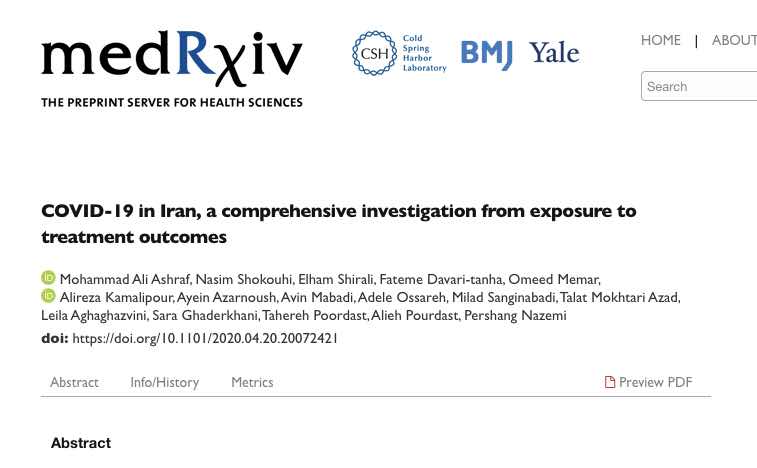Source: medRxiv
View ORCID Profile Mohammad Ali Ashraf, Nasim Shokouhi, Elham Shirali, Fateme Davari-tanha, Omeed Memar,
View ORCID Profile Alireza Kamalipour, Ayein Azarnoush, Avin Mabadi, Adele Ossareh, Milad Sanginabadi, Talat Mokhtari Azad, Leila Aghaghazvini, Sara Ghaderkhani, Tahereh Poordast, Alieh Pourdast, Pershang Nazemi
doi: https://doi.org/10.1101/2020.04.20.20072421
Abstract
Purpose There is a growing need for information regarding the recent coronavirus disease of 2019 (Covid-19). We present a comprehensive report of Covid-19 patients in Iran. Methods One hundred hospitalized patients with Covid-19 were studied.
Data on potential source of exposure, demographic, clinical, and paraclinical features, therapy outcome, and post-discharge follow-up were analyzed. Results The median age of the patients was 58 years, and the majority of the patients (72.7%) were above 50 years of age.
Fever was present in 45.2% of the patients on admission. The most common clinical symptoms were shortness of breath (74%) and cough (68%). Most patients had elevated C-reactive protein (92.3%), elevated erythrocyte sedimentation rate (82.9%), lymphocytopenia (74.2 %) on admission. Lower lobes of the lung were most commonly involved, and ground-glass opacity (81.8%) was the most frequent finding in CT scans.
The administration of hydroxychloroquine improved the clinical outcome of the patients. Lopinavir/ritonavir was efficacious at younger ages. Of the 70 discharged patients, 40% had symptom relapse, (8.6%) were readmitted to the hospital, and 3 patients (4.3%) died.
Conclusion This report demonstrates a heterogeneous nature of clinical manifestations in patients affected with Covid-19. The most common presenting symptoms are non-specific, so attention should be made on broader testing, especially in age groups with the greatest risk and younger individuals who can serve as carriers of the disease.
Hydroxychloroquine and lopinavir/ritonavir (in younger age group) can be potential treatment options. Finally, patients discharged from the hospital should be followed up because of potential symptom relapse.
Competing Interest Statement
The authors have declared no competing interest.
Funding Statement
This project was not funded by any agency or organization.
Author Declarations
All relevant ethical guidelines have been followed; any necessary IRB and/or ethics committee approvals have been obtained and details of the IRB/oversight body are included in the manuscript.
Yes
All necessary patient/participant consent has been obtained and the appropriate institutional forms have been archived.
Yes
I understand that all clinical trials and any other prospective interventional studies must be registered with an ICMJE-approved registry, such as ClinicalTrials.gov. I confirm that any such study reported in the manuscript has been registered and the trial registration ID is provided (note: if posting a prospective study registered retrospectively, please provide a statement in the trial ID field explaining why the study was not registered in advance).
Yes
I have followed all appropriate research reporting guidelines and uploaded the relevant EQUATOR Network research reporting checklist(s) and other pertinent material as supplementary files, if applicable.
Yes
See the original here: https://www.medrxiv.org/content/10.1101/2020.04.20.20072421v1

